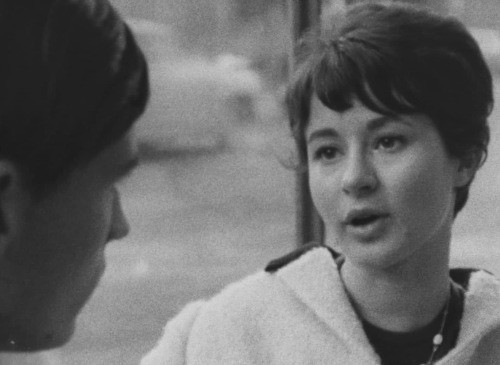Rohmerathon: Suzanne’s Career, by Scott Nye
As with The Bakery Girl of Monceau, the 54-minute Suzanne’s Career finds a young man who has committed himself to one woman suddenly involved and obsessed with another. Bertrand (Philippe Beuzen) is a rather shy sort of fellow, having not summoned the courage to properly ask out Sophie (Diane Wilkinson), despite encouragement from his womanizing friend Guillaume (Christian Charrière). Like most young men in his position, Bertrand both envies and slightly detests his more romantically successful friend, passing that disdain onto whatever latest conquest falls for the latter’s gamesmanship. The lady in question, when we meet them, is Suzanne (Catherine Sée), an office worker attending night classes at the Sorbonne to train as an interpreter.
Though clearly a more ambitious film than Bakery Girl – taking place over a longer span of time, encompassing more locations, and dealing with more nuanced forms of the relationships that crop up around people – Suzanne’s Career is a somewhat less successful venture. It has probably the most boring (I hate to use the word, but can supply no alternative) scene of Rohmer’s Moral Tales, an endless one in which Bertrand, Guillaume, and Suzanne play a form of ouija with a coffee table that has to rock back and forth to count off letter after letter to spell out revealing messages. In this way, while the overarching story – a young man begrudges a woman her independence, only to come around to envying her for precisely that – is one of Rohmer’s strongest, it’s one of his weakest in details. Beuzen’s performance never quite draws me in, too distant even for the camera to capture, and Charrière is too outlandish to provide much of an anchor.
As with Bakery Girl, it benefits tremendously from the casting of the titular role, and like Claudine Soubrier, Sée was never seen onscreen before or since. Here, though, she paints a heartbreaking portrait of someone trying to keep her chin up despite being mistreated by both of the men in her life, and, for 54 minutes, ours. As will be typical and instructive of Rohmer, we’re so embedded in the mind of our protagonist (literally, as the filmmaker again uses voiceover) that it becomes jarring when he begins taking wholly distasteful action, spurning Suzanne simply for her very existence. He’s never so overtly cruel as to lose our sympathy and turn merely into an object of fascination, quite the opposite – his actions are off-putting because his motives are so familiar. Modern culture, comedy especially, encourages us to distance ourselves from those whose company we don’t enjoy, but Suzanne’s Career forces us to see what becomes of someone taken advantage and disposed of through no fault of her own.
Nor does it turn her into a mere victim. Even aside from how it ends, Rohmer and Sée sharply suggest how Suzanne has changed in the time between her scenes. She often enters a little tired, a little sad, a little weary from putting up with the boys, who get to live a little carefree as students while she’s off earning a living. Most of her happiness seems performative. Her constant smile is aspirational. That the boys keep missing, or misunderstanding, her essential sadness is a vital Rohmer trait, showing the audience what is plainly there, yet the characters cannot see. This is also a vital cinematic trait, too often ignored. In its own context, Suzanne’s Career is a remarkable little short; in the context of Rohmer’s career…just a drop in the bucket.



























